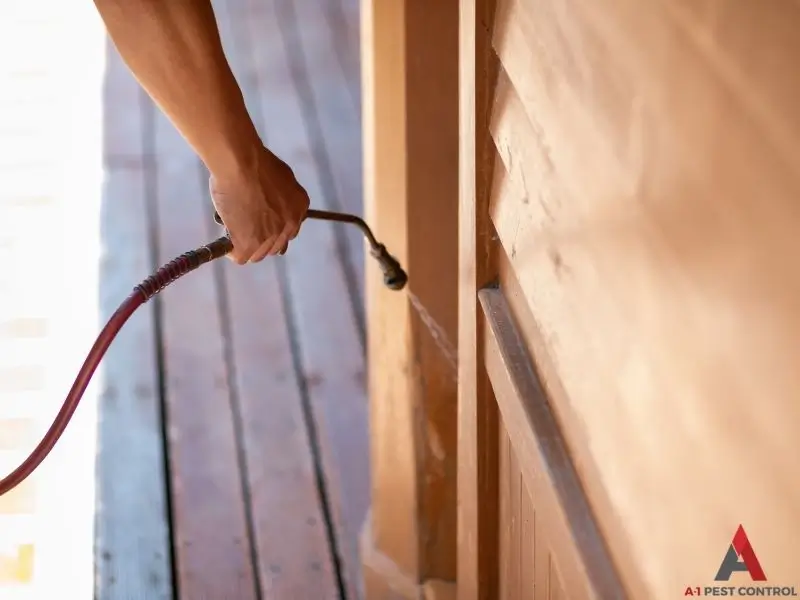
What to Know and Avoid When Doing DIY Pest Control at Home
Have you ever heard the adage; “a little knowledge is a dangerous thing”? Well, that nugget of wisdom rings particularly true when it comes to DIY pest control. While it may seem straightforward to handle pests on your own, the reality is often more complicated and potentially hazardous.
In this blog post, we’ll explore the numerous dangers of DIY pest control, including health risks, environmental impact, property damage, legal consequences, and the advantages of turning to professionals like A-1 Pest Control for help.
Table of Contents
Health Risks Associated with DIY Pest Control
One of the most significant dangers of DIY pest control lies in the potential health risks.
Using the Wrong Treatments
Misidentifying the pest at hand can lead to the use of inappropriate treatment methods, which may not only be ineffective but can also pose serious hazards. For example, using the wrong pesticide might quickly make the problem worse instead of resolving it.
This improper application and selection of pesticides can lead to dangerous exposure for you, your family, and your pets.
Chemical Sensitivity
Many individuals and pets can be sensitive or allergic to the chemicals used in pest control products. Exposure can lead to respiratory issues, skin irritations, or allergic reactions. Those with pre-existing conditions such as asthma or allergies are particularly at risk.
Improper Mixing of Chemicals
If DIY pest controllers attempt to mix different pesticides or combine them with other household chemicals, they may accidentally create toxic reactions. Some combinations can produce harmful gases or even explosive reactions, putting everyone in the household at risk.
Unintended Ingestion
Pesticides are often stored in containers that may not be clearly labeled, especially if transferred to other bottles for convenience. This can lead to accidental ingestion by children or pets, resulting in poisoning.
Psychological Effects
The stress and anxiety caused by ineffective pest control efforts can take a toll on mental health. The constant worry about infestations and the potential health risks associated with them can lead to heightened anxiety and discomfort in the home environment.
Injury Risks
DIY pest control often involves handling traps, chemicals, or tools that can pose physical injury risks. Improper handling of traps can lead to bites or cuts, while handling chemical containers can result in spills and exposure.
Disease-Carrying Pests
Certain pests, such as rodents, mosquitoes, and ticks, are known carriers of various illnesses. Inadequate pest control efforts can leave these carriers in your home, potentially putting your family’s health at risk.
Environmental Impact
The environmental consequences and dangers of DIY pest control are often underestimated, but they can’t be overstated.
Contaminated Water Sources
Many people may not realize that pesticides can contaminate water sources, posing a threat to aquatic life and ecosystems. When pesticides run off into nearby streams, rivers, or lakes, they disrupt delicate aquatic systems and can even make their way into human water supplies, raising significant public health concerns.
Impact on Non-Target Species
Many pesticides, even those marketed as "safe," can harm beneficial insects, birds, and other wildlife. For instance, insecticides may kill not only the targeted pests but also pollinators like bees and butterflies, disrupting local ecosystems.
Soil Contamination
Improper application or disposal of pesticides can lead to soil contamination. Chemicals can accumulate in the soil, affecting soil health, microbial life, and the plants that grow in treated areas. This can have long-term effects on local flora and fauna.
Air Quality Degradation
The use of aerosolized pesticides or chemical sprays can lead to air pollution within and around the home. Volatile organic compounds (VOCs) released during application can contribute to indoor air quality issues and have detrimental effects on both human health and the environment.
Soil Erosion
The dangers of DIY pest control includes damaging plant life and soil structure, potentially leading to increased soil erosion. Healthy vegetation is crucial for maintaining soil integrity, and its loss can lead to further environmental degradation.
Property Damage Risks
DIY pest control is not just a health risk—improper use of pest control products can also result in property damage.
Chemical Spills and Stains
The dangers of DIY pest control expand beyond health risks and into property damage risks. Improper application or storage of pesticides can result in spills that stain floors, carpets, or other surfaces. Some chemicals can also cause discoloration or damage to paint and finishes.
Structural Damage
Incorrectly applied treatments for pests like termites or carpenter ants can inadvertently damage structural components of a home. For example, applying too much pesticide can weaken wooden structures or lead to corrosion of metal components.
Fire Hazards
Many pest control products are flammable. If not stored properly or used near open flames or heat sources, they can lead to accidental fires, causing extensive property damage and posing safety risks to occupants.
Water Damage
DIY pest control might involve using excessive amounts of liquid treatments, which can lead to water damage if they seep into walls, floors, or ceilings. This moisture can promote mold growth and further structural issues.
Improper Sealing and Exclusion
When attempting to seal entry points to prevent pest infestations, homeowners may block ventilation systems or create traps that can cause water to accumulate, leading to rot and mold issues.
Legal Consequences
Many DIY pest control enthusiasts are unaware of the many regulations governing the use of pesticides. Failing to adhere to these regulations can result in significant legal consequences, including fines and sanctions. Ignorance of the law is not a defense when it comes to the potential harm caused by improper pesticide use.

The complexity of pesticide regulations often requires professional expertise to navigate, and the consequences of noncompliance can far exceed the costs of hiring a professional pest control service.
Financial Consequences
The financial implications and dangers of DIY pest control can also be severe. From purchasing ineffective products to the potential costs of damage and health-related issues, attempting to handle pest problems on your own can quickly add up.
Professional pest control services, on the other hand, often provide more effective, long-term solutions, saving you money in the long run.
Alternatives to DIY Pest Control
DIY pest control might work for one or two bugs in your home or business, but large infestations are worth turning to other methods. Avoid the dangers of DIY pest control with these effective and safe methods.
Integrated Pest Management
If you're looking for safe and effective pest control solutions, consider Integrated Pest Management (IPM). IPM offers a sustainable, science-based alternative to the hit-or-miss nature of DIY pest control. It focuses on long-term prevention and employs a combination of techniques, including biological control, habitat manipulation, and resistant plant varieties.
Pesticides are used only when necessary and in ways that minimize risks to human health, beneficial organisms, and the environment. By adopting IPM principles, homeowners can effectively manage pests in a responsible manner that prioritizes safety and ecological balance.
Professional Pest Control
When it comes to pest control, the expertise and tools that professionals bring to the table are unmatched by the average homeowner.
- Access to Specialized Products and Equipment: Pest control specialists, such as those at A-1 Pest Control, utilize advanced tools and products that are not readily available to the public, ensuring effective treatment.
- Expert Training and Knowledge: Professionals are trained to understand pest behavior, biology, and the most effective treatment methods, allowing them to tackle infestations more effectively than DIY approaches.
- Efficient Problem Resolution: With their expertise, pest control specialists can quickly assess the situation and resolve pest problems efficiently, saving you time and effort.
- Minimal Risk to Health and Property: Professionals follow safety protocols and best practices to ensure treatments are applied safely, reducing risks to both your health and your property.
- Comprehensive Treatment Plans: Pest control experts can identify the root causes of infestations and implement tailored strategies that address underlying issues, leading to long-term pest management.
- Peace of Mind: Knowing that trained professionals are handling your pest issues provides peace of mind that the job will be done correctly and thoroughly.
- Ongoing Monitoring and Support: Many pest control services offer follow-up visits and monitoring to ensure that pests do not return, providing continuous support and reassurance.
- Environmentally Responsible Practices: Professional pest control companies often use integrated pest management techniques that prioritize safety for humans, pets, and the environment.
- Cost-Effectiveness: While hiring professionals may seem like a higher upfront cost, their effectiveness in solving pest problems can save you money in the long run by preventing further damage and recurring infestations.
- Legal Compliance: Pest control specialists are knowledgeable about local regulations regarding pesticide use, ensuring that treatments comply with the law and minimize potential liabilities for homeowners.
Contact Us Today to Avoid the Dangers of DIY Pest Control
If you’re dealing with a pest problem in your home, don’t risk your health, property, or the environment by attempting to handle it yourself. Avoid the dangers of DIY pest control with A-1 Pest Control; Our trained professionals are ready to provide you with safe and effective pest control solutions tailored to your needs. Our pest control approach is human, environment, and pet-friendly.
Contact us today at 828-481-9140 or fill out the form below to schedule a FREE INSPECTION and take the first step toward a pest-free home.
